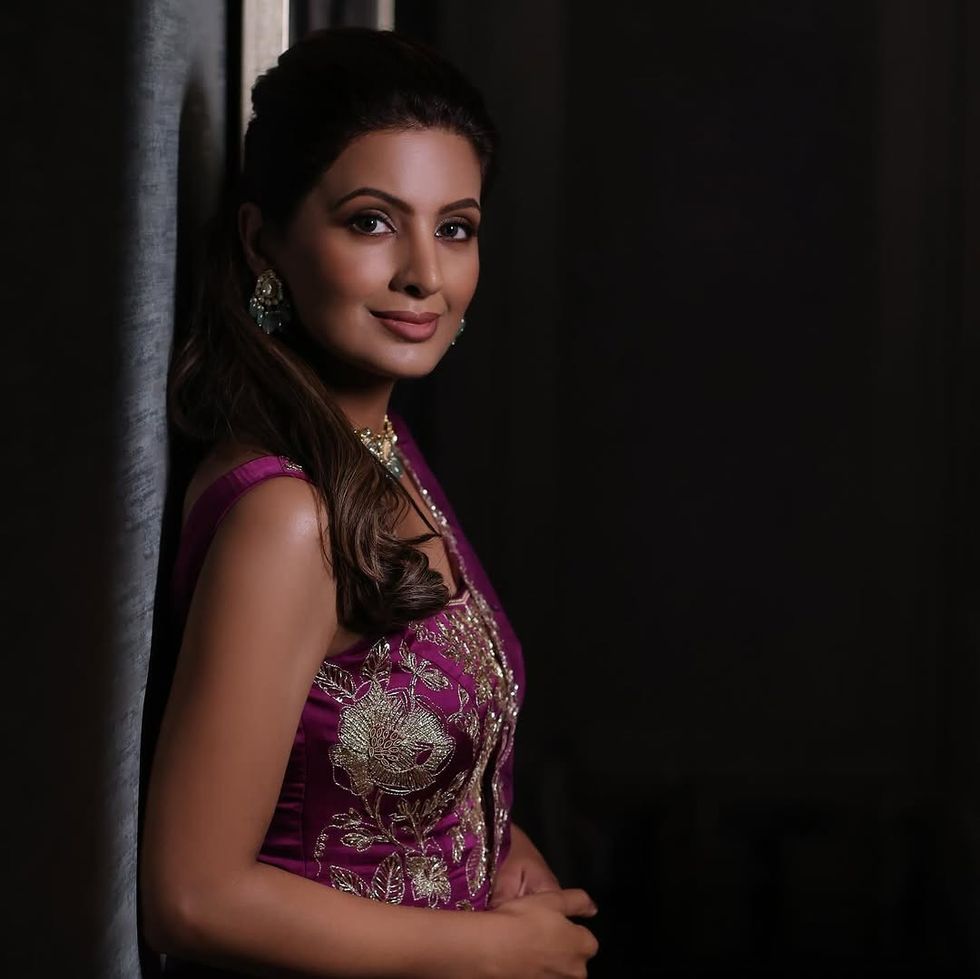Highlights:
- British-born actress Geeta Basra makes a powerful return to the screen with the Punjabi film Meher after a decade away.
- She reveals the industry once dropped her for getting married but now celebrates women balancing career and family.
- Basra plays a relatable matriarch and describes the project as a “dream role” that mirrors her own life.
- Meher is a large-scale cinematic experience shot in unique locations like Manikaran, designed for the big screen.
After a decade away building a family and a life outside cinema, British-born actress Geeta Basra is back with the Punjabi drama Meher, and this time, she’s rewriting the rules for married women on screen. For the mother-of-two, this isn’t just about returning to acting, it’s about challenging how the industry views married women and mothers while spotlighting the women who have inspired her own journey.
In an exclusive interview with Eastern Eye, Geeta opens up about her comeback, her inspirations, the shift in opportunities for women, and why this family drama feels so personal.

A dream role that feels personal
Basra chose Meher with care, calling it her “dream role.” The film is a richly woven family drama rooted in rural Punjab. She plays Simmi, the "epicentre" of her family, a relatable figure who binds everyone together through love, betrayal, and emotional upheaval. The film explores hardships not only between husband and wife but also through multiple family dynamics, including a surprising “bromance” between male characters.
“As mothers, our instincts are so similar,” Basra explains. Just as important, it was a film she could proudly share with her children. “I picked this role very carefully, for something my family can watch,” she admits. For her, stepping into Meher feels like one of the defining moments of her career.
Inspired by her mother and everyday women
If Basra’s character draws from her instincts as a mother, her real-life inspiration comes from the women around her. “My mother is my first and foremost inspiration in life,” she says warmly. “Seeing how she balanced her businesses while raising three children makes me want to do better every day. Different people inspire me at different points, but my mother has always been my guiding light.”
She also points to the resilience of ordinary women as her motivation. “Seeing women multitask, balancing life, work, children, and family is incredibly motivational. Before, women were often written off after marriage and motherhood, but today, we have the opportunity to pursue our dreams. Seeing my daughter proud of me for following my passion inspires me to do even better.”

Proudly Punjabi
For a British-born actress, questions of authenticity in playing a rural Punjabi woman were inevitable. But Basra is quick to dismiss them. “We are so rooted to our roots,” she says. “I’m now Punjab ki bahu. It’s my second home. I am Punjabi, and I’m a very proud Punjabi.” She didn’t need to study the role, she’s lived it.
Women behind the camera
Basra insists that the presence of women in production roles is just as crucial as those in front of the camera. Meher is produced by Kamal Kaur, one of the few women at the helm of large-scale Punjabi projects. “When women greenlight projects, they greenlight stories that reflect reality, stories where women aren’t sidelined after marriage but are centred,” Basra says. For her, that representation is both rare and revolutionary.

Redefining the rules for married actresses
The industry she left was far less forgiving. Basra recalls being dropped from four major films simply because she was linked to her now-husband, cricketer Harbhajan Singh. “It was either this or that. Never this and that,” she remembers. For women, the choice used to be family or fame. Today, she is headlining a major project while raising two children, something that once seemed impossible. “It’s commendable and remarkable,” she says of the change, though she emphasises much more work remains.

What’s next for Geeta Basra
With the “seal broken” on her comeback, Basra is determined to push further. She wants content-driven films that showcase her versatility, recalling how her career has already spanned everything from a bold debut to playing a villain. “I don’t want to bind myself to one kind of role,” she insists. Her only filter now is simple: would her family be proud to watch it? With several projects already lined up, she intends to make sure the answer is yes.
A bigger moment for Punjabi cinema
For Basra, Meher is also a reflection of where Punjabi cinema is heading: bigger in scale, richer in music, and designed for the cinematic experience. But she wants that ambition matched with better stories for women, especially mothers. “Women can also have a career. Women can also work after marriage,” she stresses.
- YouTube youtu.be
Geeta Basra’s message is clear: experience is not a liability. It’s her strength. With Meher, she’s redefining what it means for women to lead on screen. And for Geeta Basra, this is only the beginning.





